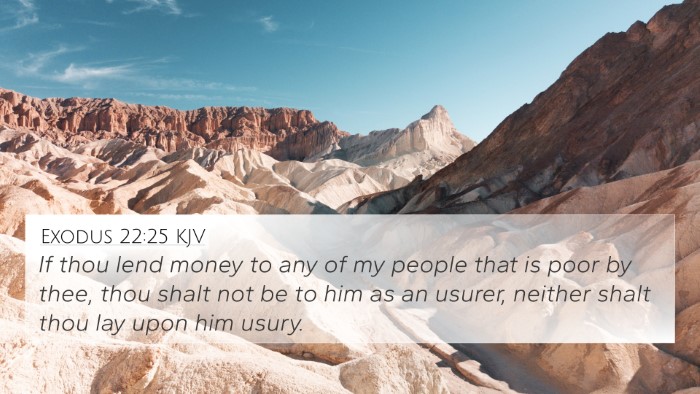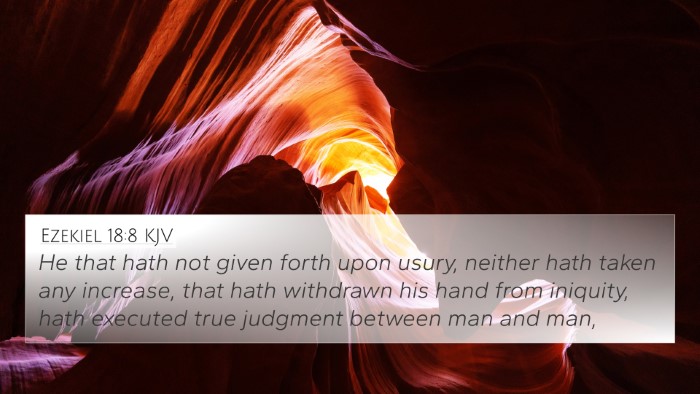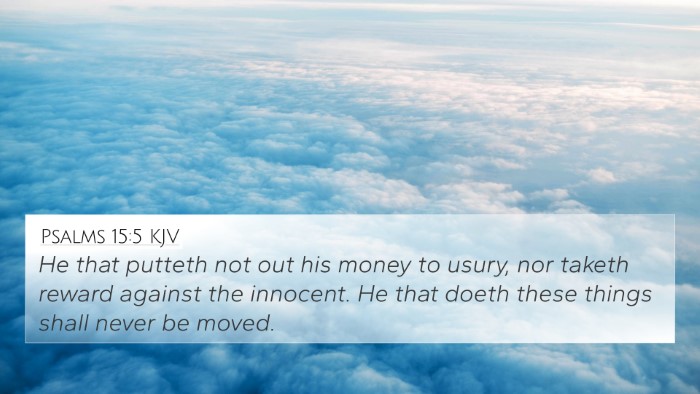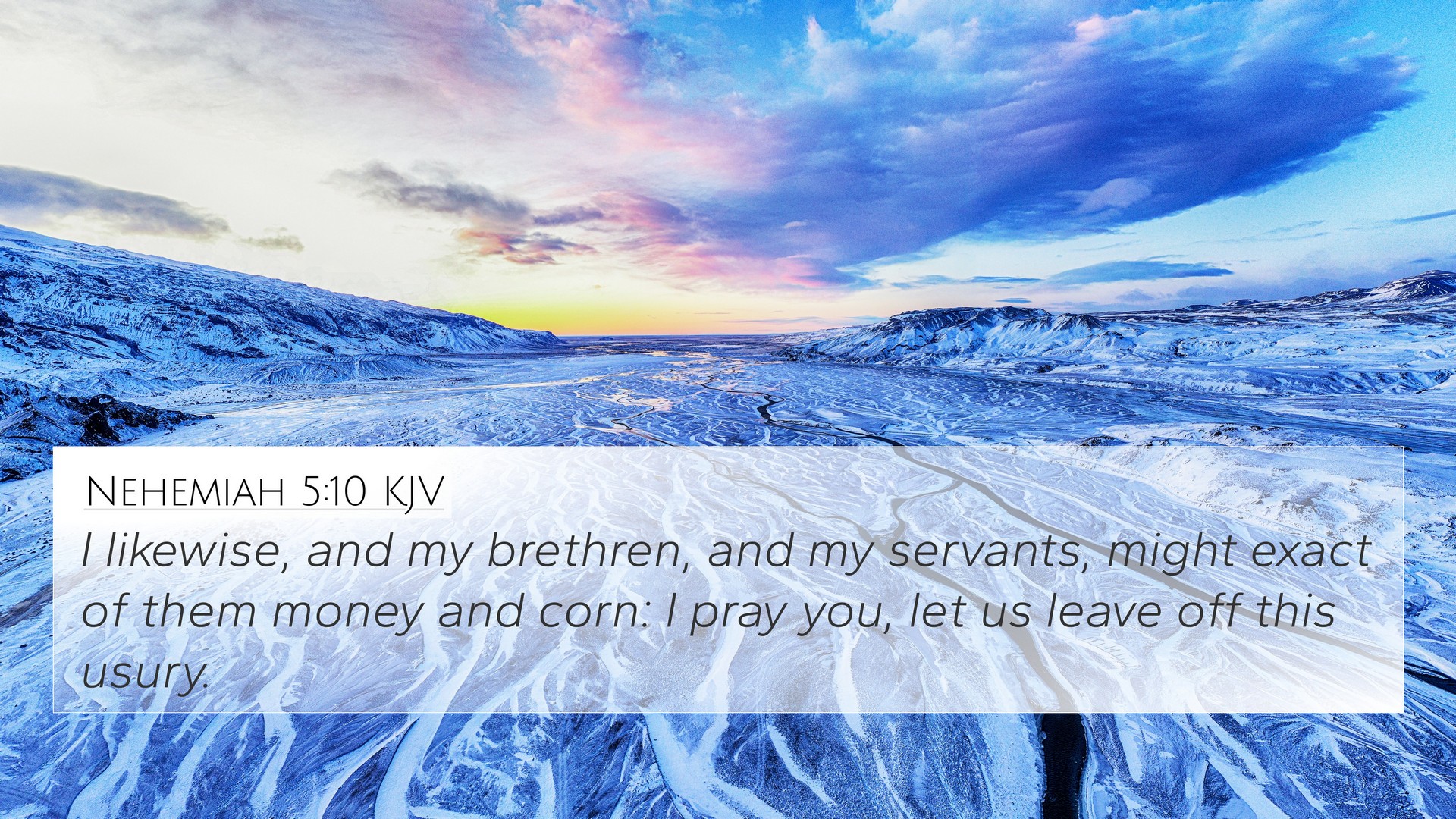Old Testament
Genesis Exodus Leviticus Numbers Deuteronomy Joshua Judges Ruth 1 Samuel 2 Samuel 1 Kings 2 Kings 1 Chronicles 2 Chronicles Ezra Nehemiah Esther Job Psalms Proverbs Ecclesiastes Song of Solomon Isaiah Jeremiah Lamentations Ezekiel Daniel Hosea Joel Amos Obadiah Jonah Micah Nahum Habakkuk Zephaniah Haggai Zechariah MalachiNehemiah 5:10 Similar Verses
Nehemiah 5:10 Cross References
I likewise, and my brethren, and my servants, might exact of them money and corn: I pray you, let us leave off this usury.
Uncover the Rich Themes and Topics of This Bible Verse
Listed below are the Bible themes associated with Nehemiah 5:10. We invite you to explore each theme to gain deeper insights into the Scriptures.
Nehemiah 5:10 Cross Reference Verses
This section features a detailed cross-reference designed to enrich your understanding of the Scriptures. Below, you will find carefully selected verses that echo the themes and teachings related to Nehemiah 5:10 KJV. Click on any image to explore detailed analyses of related Bible verses and uncover deeper theological insights.

Exodus 22:25 (KJV) »
If thou lend money to any of my people that is poor by thee, thou shalt not be to him as an usurer, neither shalt thou lay upon him usury.

2 Corinthians 6:1 (KJV) »
We then, as workers together with him, beseech you also that ye receive not the grace of God in vain.

2 Corinthians 5:20 (KJV) »
Now then we are ambassadors for Christ, as though God did beseech you by us: we pray you in Christ's stead, be ye reconciled to God.

2 Corinthians 5:11 (KJV) »
Knowing therefore the terror of the Lord, we persuade men; but we are made manifest unto God; and I trust also are made manifest in your consciences.

1 Corinthians 9:12 (KJV) »
If others be partakers of this power over you, are not we rather? Nevertheless we have not used this power; but suffer all things, lest we should hinder the gospel of Christ.

Micah 2:1 (KJV) »
Woe to them that devise iniquity, and work evil upon their beds! when the morning is light, they practise it, because it is in the power of their hand.

Ezekiel 18:8 (KJV) »
He that hath not given forth upon usury, neither hath taken any increase, that hath withdrawn his hand from iniquity, hath executed true judgment between man and man,

Ezekiel 18:13 (KJV) »
Hath given forth upon usury, and hath taken increase: shall he then live? he shall not live: he hath done all these abominations; he shall surely die; his blood shall be upon him.

Psalms 15:5 (KJV) »
He that putteth not out his money to usury, nor taketh reward against the innocent. He that doeth these things shall never be moved.

Nehemiah 5:7 (KJV) »
Then I consulted with myself, and I rebuked the nobles, and the rulers, and said unto them, Ye exact usury, every one of his brother. And I set a great assembly against them.

Philippians 1:8 (KJV) »
For God is my record, how greatly I long after you all in the bowels of Jesus Christ.
Nehemiah 5:10 Verse Analysis and Similar Verses
Understanding Nehemiah 5:10
Nehemiah 5:10 states: "And likewise I, my brethren, and my servants, might exact of them money and corn: I pray you, let us leave off this usury." This verse is a significant point in Nehemiah's efforts to rectify social injustices faced by the poorer classes in Jerusalem during the rebuilding of the walls. Below is a summary of its interpretation drawn from public domain commentaries.
Commentary Insights
The insights from well-known biblical commentators highlight the moral climate of Nehemiah's time and address important themes, including justice, community responsibility, and the ethical treatment of fellow Israelites.
Matthew Henry's Commentary
Matthew Henry emphasizes the importance of justice and community welfare, arguing that taking advantage of the needy through usury undermines the social fabric. He explains:
- Usury Critique: Nehemiah stands against the practice of usury, pointing out that this practice was contrary to the Mosaic law, which forbade charging interest on loans to fellow Israelites (Exodus 22:25).
- Personal Accountability: Henry highlights Nehemiah's commitment, noting that even as a leader, he refrains from exploiting others and urges his companions to do likewise.
Albert Barnes' Commentary
Albert Barnes provides a detailed analysis of the socio-economic implications of this verse:
- Community Solidarity: Barnes remarks that Nehemiah's refusal to engage in usury illustrates the significance of community solidarity during times of rebuilding and distress.
- Scriptural Context: He elaborates on the biblical context, correlating with Deuteronomy 23:19-20, which specifically instructs not to charge interest among brethren.
Adam Clarke's Commentary
Adam Clarke also counters various arguments around usury and its validity:
- Injustice Against the Poor: Clarke stresses that lending money at interest was seen as a means of oppression, particularly against the poor and vulnerable population.
- Nehemiah’s Leadership: He underscores Nehemiah's role as a leader motivated by compassion and moral integrity, in contrast to the selfish practices surrounding him.
Thematic Connections
This verse is rich in themes that connect to various biblical principles:
- Justice and Fairness: The urgent call for justice in dealing with one another reflects the fundamental biblical tenet of fairness.
- The Principle of Mercy: The emphasis on showing mercy towards the needy highlights the biblical call for compassion.
Cross-References
Nehemiah 5:10 has several relevant cross-references that enrich its understanding:
- Exodus 22:25: Prohibiting usury among the Israelites.
- Leviticus 25:36-37: Instructions on lending without interest.
- Deuteronomy 23:19-20: Command to avoid interest on loans to fellow Israelites.
- Psalms 15:5: Describes characteristics of a righteous person who does not lend money at interest.
- Proverbs 28:8: Discusses the consequences of unjust gain.
- Jeremiah 22:13: Condemns those who exploit their laborers and ignore justice.
- Ezekiel 18:8: Prohibits taking advantage of others for personal gain.
Conclusion
In summary, Nehemiah 5:10 serves as a powerful reminder of the need for ethical dealings among community members. The combined insights from various commentaries stress the importance of justice while cross-referencing related scriptures reinforces the Bible's consistent call for mercy and fairness.
For those engaged in Bible cross-reference studies, understanding this verse's context and implications can pave the way for deeper explorations of biblical themes, encouraging a thematic analysis that connects the Old and New Testaments.



